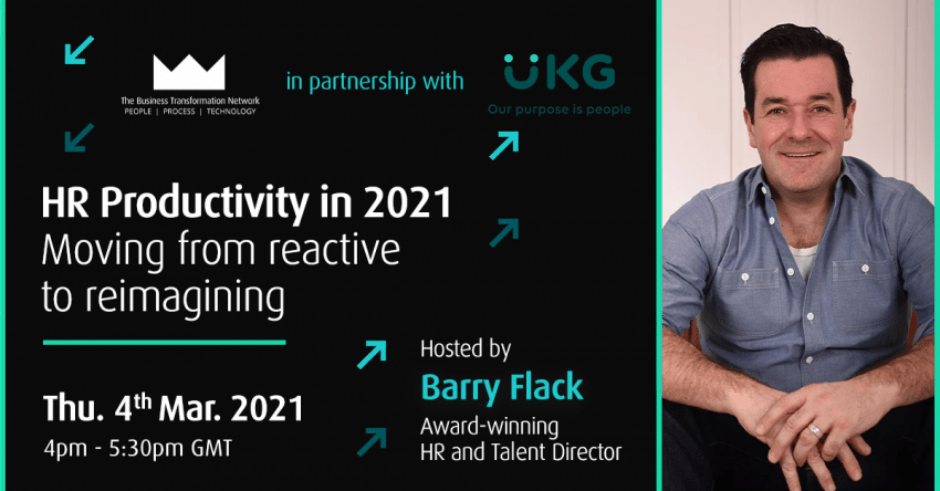How can we put people at the centre of everything we do? 2020 not only put the role of HR into the spotlight but showcased the opportunity that the People leader has to reimagine our businesses and build a more resilient, collaborative and technology-focused environment.
The BTN, in partnership with UKG, brought together some of the most forward-thinking leaders across industry to discuss the evolving people function with a focus on showcasing added value through the use of technology as an enabler.
The challenges of tomorrow are the ones that must be considered by HR now with a key focus are the trust crisis, the evolving workforce and technological acceleration. So how can HR bridge the gap? What role does HR service delivery play in being problem solvers?
Here are the key takeaways:
- Improvements in productivity can have major impacts on a business, from the speed of delivery to revenue. The group discussed how aligning individuals key strategic objectives to business objectives can showcase major improvements to productivity as a whole across teams. The evolving world of work has had a significant impact on how the employee experience has evolved itself. In a remote/hybrid environment, managing needs to be made as accessible as possible and the employee experience itself needs to be consumerised so we start to consider each stage/engagement of the employee lifecycle and the direct technological impact that occurs.
- Organisations should be able to utilise new technology advancements in the same way that a consumer does in their personal life. The growth of SAAS solutions versus On-Premise has meant organisations can use new technology to roll out agile for example, where they can test, try and if it fails, then try again the following month. The speed of change is not getting any slower, the advancements of technology is not getting any slower and we as HR need to bring our organisations on the same journey as a consumer.
- Technology itself can facilitate the solution to the challenge that being remote creates around accessibility but how can HR help the business to bring employees together to create a more accessible knowledge library? We need to create an effective level of blended learning which enables our people to be more productive, whilst continuing to show value for our customer. We want our people to be utilising the workplace in a more effective way going forward without splitting any communities up that have been formed within our organisations.
- Creating a culture of ‘getting it wrong is getting it right’ means our organisations can be always learning from our mistakes and continuously improving.
- The pandemic was a catalyst for change across business and the use of technology platforms such as LinkedIn Learning and Microsoft Teams have accelerated astronomically. With great technology comes adoption challenges, HR needs to be the instigators of ensuring our employees are using the technology to its optimum capabilities and having a deeper understanding of what ‘effective’ means as a user of that technology. The effects of rapid culture change have had widely positive impacts but some ‘traditional leaders’ are still aspiring for ‘traditional organisations’ to return when employees can return back to the office. HR can be the team that delivers a message about the positive impact on productivity that the reimagined workplace has had and deliver the correct future of work messages that are needed to the leadership team. This is needed to get buy-in from leadership so that it becomes a data-led approach, rather than a leadership led approach.
- The role of technology has been under increased pressure to deliver during 2020’s time of need. The cultural change that organisations have gone through have been enabled by the technology which has been implemented in align with what the business is trying to pursue. How do we make sure we have the leadership capability within our organisations to enable future change/transformation programs that we want to initiate? HR needs to be front and central to driving the future strategy and vision of the organisation but HR leaders need to have a level of understanding across the business and be hybrid and specialists in a variety of roles. This will allow HR to be business people first and HR people second. Initiatives that are therefore implemented by organisations move away from having HR labels on them and become business solutions that HR work to rollout.
- The final point of discussion was around the role of innovations and technology and where HR should be prioritising their efforts. How can we continue to deliver transformation when everyone is working from home? How can AI facilitate the production side of organisations? Good technology is frictionless and when it comes to innovative programmes that are looking to be rolled out, don’t solve for the business, HR is the business.
In Summary
The role of HR has evolved and adapted enormously over the past 12 months but there are a few things that HR can really do to thrive in their own roles and ultimately, the organisation as a whole. HR needs to boost productivity with agile and efficient processes, focus on increasing employee engagement with a consumer-level of service, manage global compliance & improve data protection and finally meet the challenges of tomorrow and prepare for the unprecedented with adaptive systems.

